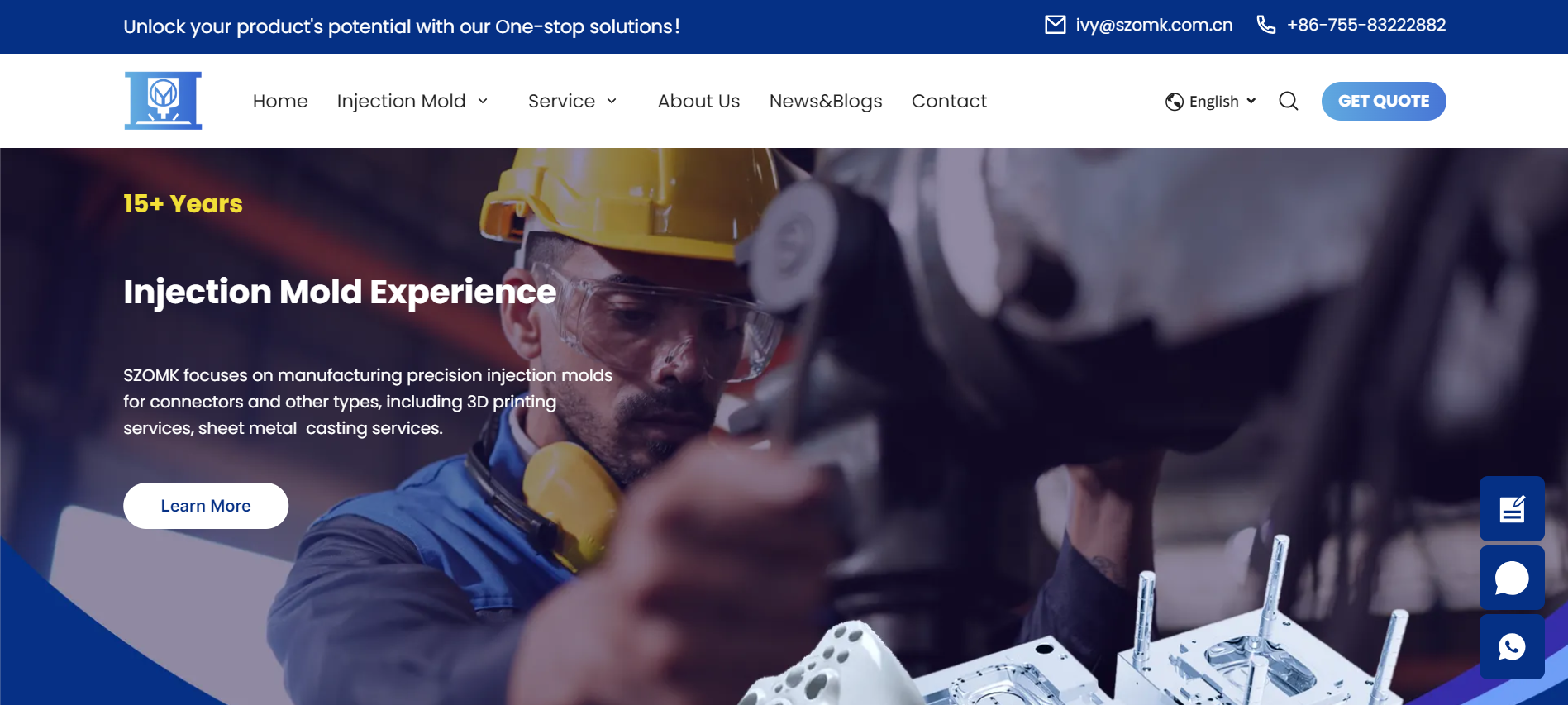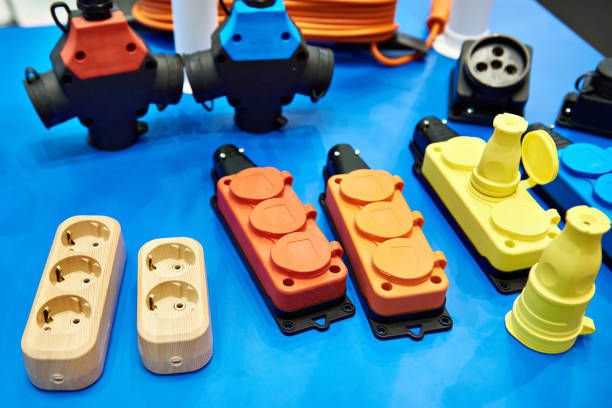Unlock your product's potential with our One-stop solutions!
+86-755-83222882

GET QUOTE
What is the Best Material for an Enclosure?
When it comes to selecting the ideal enclosure material for your project, the choices can seem overwhelming. Whether you are housing delicate electronics, protecting industrial controls, or designing a custom project, choosing the right plastic enclosure is critical. With the right guidance, such as the expert advice provided by SZOMK's professional injection molding services, you can navigate these choices with confidence. This article will delve into the various types of enclosure materials, their benefits, and guide you on what is the best material for an enclosure.
Understanding Enclosure Materials
Choosing the right enclosure material is essential for ensuring durability, functionality, and protection. Enclosures can be made from various materials including plastic, metal, and composites. Each material has its own set of properties that make it suitable for specific applications.
Plastic Enclosures
Plastic enclosures are incredibly popular due to their versatility, lightweight nature, and cost-effectiveness. Common types of plastics used include ABS (Acrylonitrile Butadiene Styrene), polycarbonate, and polypropylene.
Advantages of Plastic Enclosures:
- Cost-Effective: Plastic is generally cheaper than metals like aluminum or steel.
- Lightweight: Easier to handle and transport.
- Corrosion-Resistant: Unlike metal, plastic does not rust.
- Insulation: Plastic provides excellent electrical insulation.
Disadvantages of Plastic Enclosures:
- Less Durable: Can be less robust compared to metals.
- Heat Resistance: Not as heat resistant as some metals.
- UV Degradation: Some plastics can degrade when exposed to UV light for extended periods.
Metal Enclosures
Metal enclosures, typically made from aluminum, steel, or stainless steel, are known for their durability and strength. They are often used in environments where robustness is paramount.
Advantages of Metal Enclosures:
- Durability: Highly resistant to impact and mechanical stress.
- Heat Resistance: Better at dissipating heat compared to plastic.
- Shielding: Excellent for electromagnetic interference (EMI) shielding.
Disadvantages of Metal Enclosures:
- Cost: Generally more expensive than plastic.
- Weight: Heavier, which can be a drawback in some applications.
- Corrosion: Metals can corrode, although treatments and coatings can mitigate this.
Factors to Consider When Choosing Enclosure Material
When deciding on what is the best material for an enclosure, several factors come into play. Here are some critical considerations:
Environmental Conditions
The environment in which the enclosure will be used significantly impacts the choice of material. For example, outdoor applications might require UV-resistant materials, while industrial settings might need robust, impact-resistant enclosures.
Electrical Requirements
For housing electrical components, the enclosure material needs to provide adequate insulation and protection against electrical interference. Plastic enclosures often excel in providing electrical insulation, whereas metal enclosures can offer superior EMI shielding.
Heat Dissipation
Some applications generate significant heat. Metal enclosures are better at dissipating heat compared to plastic, making them suitable for high-temperature environments.
Aesthetic and Design
The appearance and design flexibility of the enclosure can also influence material choice. Plastic enclosures can be molded into complex shapes and come in various colors, while metal enclosures offer a more rugged and industrial look.
Comparing Common Enclosure Materials
ABS Plastic
ABS is a common choice for plastic enclosures due to its balance of strength, rigidity, and impact resistance. It’s also relatively inexpensive and easy to mold, making it a popular choice for consumer electronics and industrial applications.
Polycarbonate
Polycarbonate is known for its high impact resistance and optical clarity. It’s more expensive than ABS but offers superior durability. It’s often used in applications where transparency and strength are required, such as in safety goggles and machine guards.
Polypropylene
Polypropylene is highly resistant to chemicals and offers good fatigue resistance. It’s not as strong as polycarbonate or ABS but is highly flexible and lightweight. This makes it suitable for applications involving repeated bending or flexing.
Aluminum
Aluminum is lightweight yet strong and offers excellent corrosion resistance. It’s commonly used in outdoor and industrial applications where durability and heat dissipation are critical. It’s more expensive than plastic but provides a good balance of properties for many uses.
Stainless Steel
Stainless steel enclosures offer superior corrosion resistance and strength, making them ideal for harsh environments. They are often used in the food and pharmaceutical industries where hygiene and durability are paramount. However, stainless steel is the most expensive option and can be quite heavy.
Choosing the Best Material for Your Enclosure
So, what is the best material for an enclosure? The answer depends on your specific needs and application. Here are some guidelines to help you decide:
For Cost-Effective Solutions
If budget is a primary concern, ABS plastic enclosures offer a good balance of cost, durability, and ease of manufacturing. They are suitable for a wide range of applications, from consumer electronics to industrial housings.
For High-Impact and Outdoor Use
If the enclosure needs to withstand high impact or is intended for outdoor use, polycarbonate or aluminum might be the better choice. Polycarbonate provides excellent impact resistance and can be used in both transparent and opaque forms. Aluminum offers good weather resistance and heat dissipation, making it ideal for outdoor and industrial settings.
For Chemical Resistance
In environments where chemical resistance is crucial, polypropylene enclosures can be highly effective. They are used in applications where exposure to chemicals or solvents is common, such as in chemical processing plants.
For Heat Management
For applications involving high temperatures or the need for heat dissipation, metal enclosures, particularly aluminum, are superior. Aluminum’s thermal conductivity helps in managing heat better than plastic.
For Hygienic Environments
In sectors like food processing or pharmaceuticals, where hygiene is critical, stainless steel enclosures are the best option. Their corrosion resistance and ease of cleaning make them ideal for these applications.
Conclusion
Choosing the right enclosure material is essential for ensuring the longevity and functionality of your project. Whether you opt for a plastic enclosure made from ABS, polycarbonate, or polypropylene, or a metal enclosure from materials like aluminum or stainless steel, each choice has its unique advantages and disadvantages.
At SZOMK, we specialize in providing high-quality plastic enclosures tailored to meet your specific needs. Our expertise in injection molding ensures that you receive durable, reliable, and precisely crafted enclosures. Whether you need standard or custom solutions, our extensive range of products and commitment to quality make us the perfect partner for your enclosure needs. Choose SZOMK for your next project and benefit from our extensive experience, innovative solutions, and dedication to customer satisfaction. Let us help you find the best material for your enclosure to ensure your project’s success.


